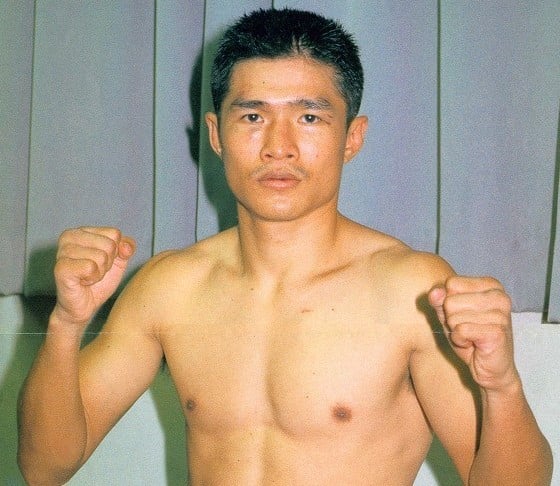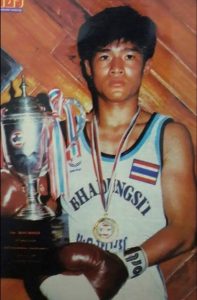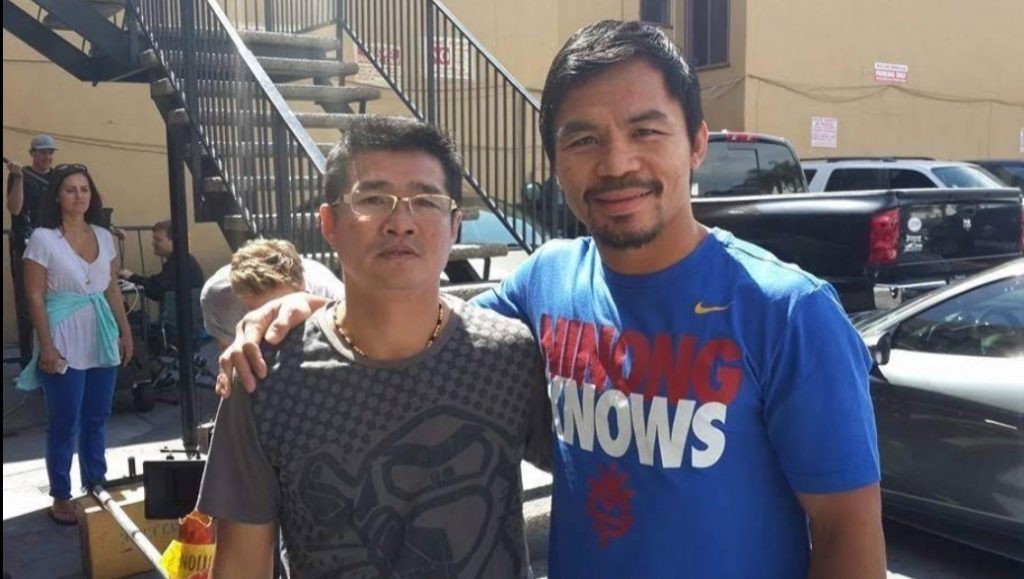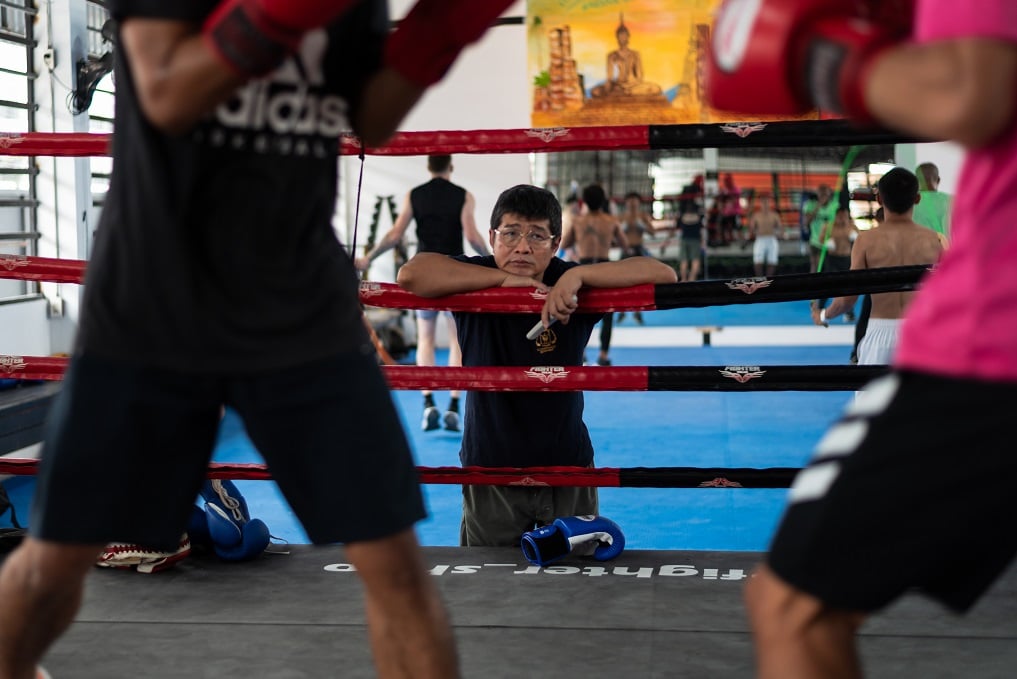Best I Faced: Chatchai Sasakul

Thailand’s Chatchai Sasakul was a very successful Muay Thai fighter before switching codes and enjoying a successful amateur career. He later won the WBC flyweight title as a professional. He looked set for an extended championship reign only to run into a then-unknown Manny Pacquiao.
Sasakul, who as the eldest of four children, was born in Nakhon Ratchasima, Thailand on February 5, 1970.
“My house was very poor,” Sasakul told The Ring. “My parents brought me from the provinces when I was only 4-years-old.
“My father worked as a delivery driver for the Port Authority of Thailand. My mother had to sell fruit or Thai desserts and take care of the house.”
Sasakul got an early introduction into combat sports.
“My father was very fond of watching Muay Thai, so wanted me to fight,” he recalled. “I was 7 and didn’t like it at all [Laughs.]”

Chatchai Sasakul
His training regime was particularly arduous.
“I had to wake up at 5 a.m. to run, then go to school at 7 a.m.,” he explained. “Come back from school at 3 p.m. I had to practice boxing until 6 p.m. Go home, take a shower, eat and go to bed at 8 p.m. I had to do that every day. I didn’t play like other kids.”
After around 150 Muay Thai contests, he decided to switch to boxing and hit the ground running as an amateur.
“I boxed Muay Thai until I was 16 years old, then I went to amateur boxing for the first time,” said Sasakul, who was on the Thailand amateur boxing team for close to 5-years. “I was able to get a gold medal [at a tournament] and represent the Thai national team.
“I have been to many competitions. I won two SEA Games gold medals in Indonesia and Malaysia. Silver at the Asian Games in Beijing. I went to the Olympic Games in Seoul, South Korea.”
At the Olympics, Sasakul won two fights before being edged out by Róbert Isaszegi 3:2 at the quarter-final stage.
He returned home and won gold at the prestigious King’s Cup, in Bangkok, Thailand in 1989 and 1990. He was awarded “Best Boxer of the Tournament.”
However, rather than hang around for the Olympics in 1992, Sasakul decided to turn professional and made about 200,000 baht [around $5,600 dollars] for a first-round knockout over Bert Refugio in August 1991.
From early on, Sasakul was marked out as having world-title potential. In just his fourth bout, he stopped Ric Magramo (TKO 8) for a WBC regional title. He notched further wins over future world title challenger Alexander Makhmutov (UD 12) and former WBC junior flyweight titlist Rolando Pascua (UD 12).
After going 20-0, the impressive Thai fighter traveled overseas for the first time as a professional to face the excellent WBC 112-pound titlist Yuri Arbachakov in Tokyo, Japan in September 1995.
“It was the first time in my life to fight for a world championship,” he said explaining his lack of experience which cost him as he dropped a competitive 12-round unanimous decision. “I was very excited for this fight. I overtrained. I practiced for 3-months and it was so hard, I felt so tight. In the ring, I can think but can’t act on it. It made me lose that day. He had a beautiful style and was very sharp.”
Sasakul returned to the winner’s circle, reeling off several wins. In the summer of 1996, Arbachakov injured his right hand, which meant he spent 15-months on the sidelines recovering. To keep the title active the WBC matched Sasakul with iron-jawed Ysaias Zamudio in May 1997. Sasakul claimed the WBC Interim flyweight title by 12-round unanimous decision. He made one defense against future WBO junior flyweight titlist Juan Domingo Cordoba (RTD 7).
Then it was time to consolidate the championship against a fit and healthy Arbachakov. The Japanese paymasters brought the fight to Sapporo, Japan in November 1997.
While Sasakul had grown as a fighter and was in the ascendency, Arbachakov was returning from an extended period of inactivity and not the fighter he once was.

Chatchai Sasakul (left) and Manny Pacquiao
“This time, I practiced only one-and-a-half months, [my] training was lighter,” explained Sasakul, who won a 12-round unanimous decision. “I felt refreshed on fight day and succeeded; I was very happy. The highest purse [of my career] was $220,000 against Arbachakov. There were some celebrations and I went to Phuket for about a week.”
Sasakul went on to make two defenses against Young Jin Kim (UD 12) and Young Soon Jang (TKO 5).
He then came up against a teenage Manny Pacquiao in December 1998. Although the Thai was ahead on the scorecards, Pacquiao kept coming at him and eventually got the win.
“I had problems with my family and didn’t care about training and underestimated him,” Sasakul admitted. “I watched tapes of his fights and thought I would win but I was wrong. He had a very strong mind and didn’t give up. I thought I could survive. I was very surprised, he attacked and punched me hard.
“After Round 4, I felt exhausted, I tried to make it through but it didn’t work. I lost to him in the eighth round. He hit me and I came to my senses in the changing room. I am proud to have fought him.”
Sasakul stayed active and won all except one of his fights over the next decade. In the twilight of his career was rewarded with a shot at WBA/WBC junior bantamweight titlist Cristian Mijares in Monterrey, Mexico in August 2008.
“I left Thailand a week before the fight, The plane left Thailand and connected in Hong Kong. There was a storm causing it to be unable to continue to fly,” he recalled. “I was stuck in Hong Kong for two days. I had to fly back to Thailand again, stay one night and change airlines. This time the connection in Frankfurt had a 9-hour layover and then goes to Mexico. Then transfers to the city that had the fight. I arrived and we did the press conference, the next day was the weight in and then the day of the fight.
“For this fight, I’m old. I prepared myself but it wasn’t good enough. The champion was younger and very good.”
Sasakul was down in the second and third rounds before the fight was waved off in round three.
The former champion fought once more before retiring with a record of (63-4-1, 38 knockouts). In retirement, he initially opened a restaurant but now owns and operates “Sasakul Gym.” Reigning WBA strawweight beltholder Knockout CP Freshmart and former WBC counterpart Panya Pradabsri both fight out of his gym.

Chatchai Sasakul (center) is now a trainer for the future generation of Thai champs – Photo by Wasim Mather
“My focus now is on creating a new generation of boxers and I enjoy teaching.” he said proudly.
Sasakul, now 53, is married and have four children and lives in Pathum Thani, on the outskirts of Bangkok.
He graciously took time to speak to The Ring about the best he fought in 10 key categories.
BEST JAB
Yuri Arbachakov: He came from a good amateur background and the jab is important. He had a strong jab, and I could feel when it landed that it hurt.
BEST DEFENSE
Ysaias Zamudio: He was short, kept his arms up and didn’t give much of a gap in front of his chin and it was hard to punch him clean.
BEST HANDSPEED
Manny Pacquiao: He is a hardworking boxer that makes him skilful in punching very quickly. He threw many punches and continuously.
BEST FOOTWORK
Arbachakov: Again, his amateur pedigree was important. He is from the Russian national team. It is normal for the team to practice footwork. His footwork was very natural.
SMARTEST
Pacquiao: He is an offensive fighter, who can defend himself well and can attack at any time. He could fight and control the action. He could get in and out.
STRONGEST
Pacquiao: He was stronger than other flyweights. He was so determined and tried to attack me from the start of the first round.
BEST PUNCHER
Pacquiao: His power hurt me every time he punched me.
BEST CHIN
Zamudio: I punched him cleanly several times and he didn’t show any affects.
BEST BOXING SKILLS
Arbachakov: He had a beautiful style. His movement and jab impressed me. When you missed, he made you pay with a sharp right hand.
BEST OVERALL
Pacquiao: Everyone has a different style of boxing. Manny doesn’t have a fixed form; he tries to adapt it throughout the match. His mind fights every punch. His punches are powerful, he’s a disciplined athlete. He was 19-years-old when we fought and this fight made him grow up. He spent all his time training and with his will he won world titles all the way up to junior middleweight. He was one of the best boxers in the world.
Takashi Aoshima and Ken Takayama help co-ordinated and make this feature possible. The Ring appreciates their help.
Questions and/or comments can be sent to Anson at [email protected].















